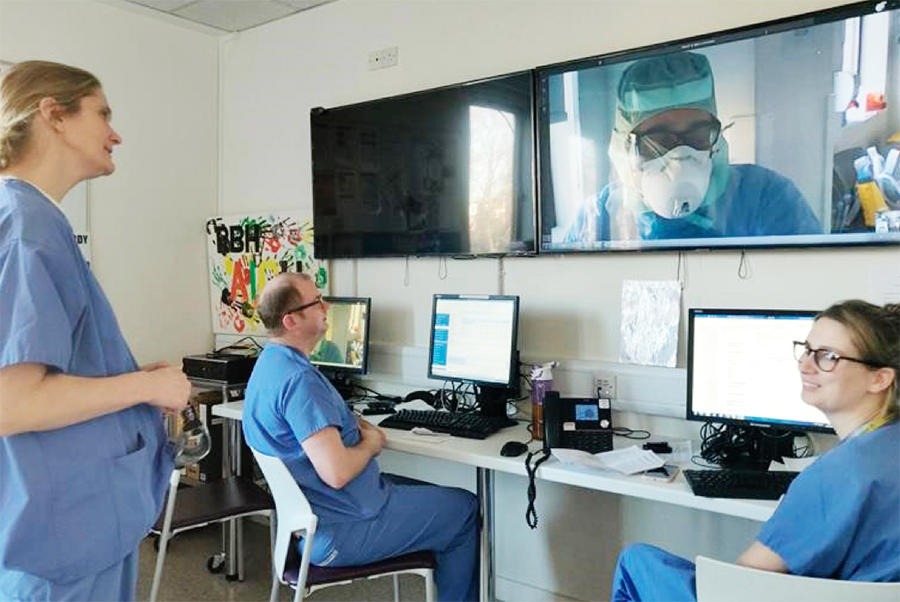Our dedicated staff rolled out an astonishing number of new initiatives to keep services running for patients during the pandemic.
Nick Hunt, executive director for Harefield and director of service development, said: “Emergency situations often bring out the best in people and that’s certainly been the case for us. Some initiatives that we’d talked about for months, or even years, materialised in weeks.
“As a Trust, we’re well-known for our innovation, but the speed at which these solutions were found was remarkable; we have literally transformed the clinical landscape.”
A new virtual communication system was set up in just 14 days to give frontline teams round-the-clock remote access to specialist colleagues at the Trust.
The equipment for the system was crowdsourced via social media and through the Royal Brompton & Harefield Hospitals Charity.
Using a simple set-up, high-resolution webcams were linked to computers at patients’ bedsides in intensive care to enable frontline clinicians to get on-demand access to virtual support from consultants any time they needed it.
The system also allowed patients in intensive care to see and talk to family members who were unable to visit due to infection risks.
For the wife of one patient, the webcam was an opportunity to comfort and connect with her husband by singing to him, alongside their two children. For other families, it allowed them to spend precious time speaking to their loved ones to support recovery.
Laura Rowlands, senior staff nurse on Harefield Hospital’s intensive therapy unit (ITU), said: "What started as a way of helping staff communicate with each other, evolved into a way of letting families onto the ward as if they were physically there.
“A huge part of my role is to look after the families of patients, so seeing what this has meant to them and for their morale – whether it be individual patients speaking to their husband or wife for the first time since entering the ITU, or a whole family getting together on a smartphone to dial into the virtual system – has been incredibly uplifting.”
A member of one patient’s family echoed her comments, explaining: “My mother, sister and I have taken tremendous comfort from the video calls that the ITU team at Harefield Hospital have been able to arrange with my father. This incredible system has allowed us to see Dad, to tell him how much he is loved and means to each of us, and to encourage him to remain strong and recover.
"We have also been able to see and talk to some of the incredible doctors and nurses that have been so attentive, dedicated and professional. The system has even allowed them to monitor Dad’s responsiveness to our voices while they are reducing his sedation and slowly waking him up. When all we want to do is be by Dad’s bedside and will him on to a full recovery, the system has given us the opportunity to be a little closer to him.”
Other examples of innovation accelerated by the pandemic include:
- Offering many of our outpatients the opportunity to attend ‘virtual’ appointments by video using a secure web-based platform called Attend Anywhere, which is now available as part of a national programme (see Changing working practices).
- Introducing home testing kits that allow patients to carry out certain tests at home rather than in hospital. Examples include a capillary blood test and a cough swab test.
- Launching Microsoft Teams to enable many more staff to work from home, with easily accessible technology to allow meetings both across the Trust and with external organisations.
- Launching smartphone applications (apps) through which patients on cardiac surgical waiting lists and with long-term chronic diseases such as asthma can record and report symptoms, enabling better prioritisation of treatment according to clinical need.

< Contents
